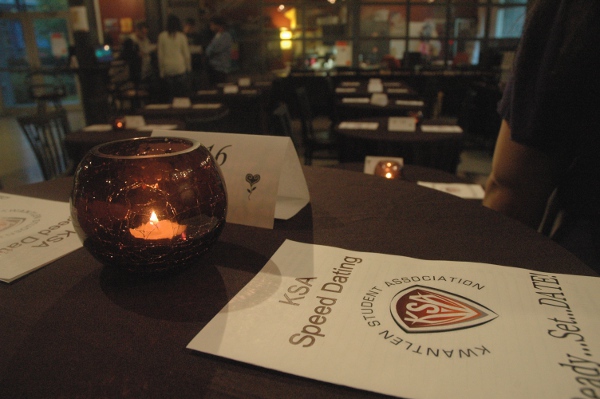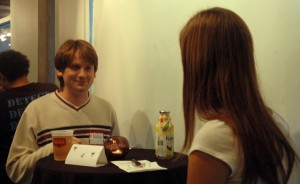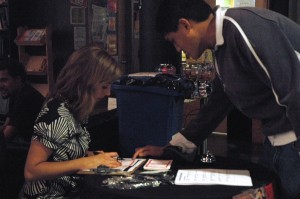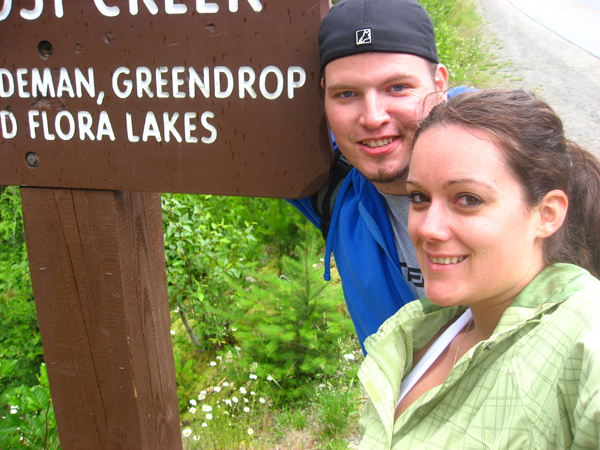College-age students: taking the soulmate search on-line
November 14, 2010 by Miranda Gathercole · Leave a Comment
By Miranda Gathercole and Sarah Casimong
Finding a soulmate can be tough.
When the club and bar scenes aren’t cutting it and Mr. Right hasn’t managed to pop up in everyday life, some, including university students, are turning to the internet for dating. In fact, last year the Boston Globe reported the use of online dating among college-age students is rising.
Emmeli Rosenberg Lassesen, 25, had a difficult time finding the right guy. She found that looking at options online allowed her to narrow the field down a good match.
“I’m tall, so I think for me that was one of the things that’s hard to find when [I] meet people, ’cause I like taller guys,” said Rosenberg Lassesen.
“I’m just slightly under six feet. So you know if you go out to the club with your girlfriends and you’ve got your high heels on and you’re 6’3, 6’4, you kind of don’t get approached by many guys.”
For four years she experimented with profiles at different on-line sites, including eHarmony and Lavalife. In the end, she found PlentyofFish to be the best option because of a variety of people and free profiles. (Lavalife and eHarmony offer some tools for free but require subscriptions that have a base rate of around $15 to $20 a month.)
“There really actually isn’t a difference [between free and paid sites],” said Rosenberg Lassesen. “Some people think that there would be a difference, because if someone was paying for the site, they’re more looking for something, but the quality of people between a free site and a paid site was the exact same. There was no difference at all, which I found out after spending the money.”
PlentyofFish.com is a free online dating engine, based in Vancouver, that matches couples based on their written descriptions of goals and aspirations, what makes them unique and their taste in music. The site boasts, “Over 32,000 couples have sent in a testimonial telling us how PlentyofFish helped them find their soulmate.”
Four months ago, Rosenberg Lassesen found success on the site when she met her boyfriend, Adam Gill.
“He messaged me first. I’ve done the online dating thing for a while and I’ve always just had a policy that if a guy likes me he’s gonna message me. I’m kind of old-fashioned,” she said.
“The big thing for me is I wouldn’t add someone on Facebook until I talked to them on MSN for long enough that I felt I had a good gauge of who they were. If you add someone on Facebook, they have your last name so there’s a safety issue with that.
“I actually wouldn’t give out my number very easily to people. I would sort of leave it. I’d actually talk to them for a couple of weeks on MSN and if we were going to meet up I’d [suggest] somewhere public. Even if they offered to pick me up, I’d always say ‘I’ll meet you there.’ It’s common sense that you have to use for safety. If you don’t use your common sense, what do you expect?”
Other popular dating sites include Match.com, lifematescanada.com, and Okcupid.com.
Video: Who pays when you’re on a date?
November 8, 2010 by Jocelyn Gollner · Leave a Comment
Jocelyn Gollner, Miranda Gathercole and Sarah Casimong explore what Kwantlen students think about traditional gender roles in dating. Students voice their opinion about what they think about the expectation of guys having to pay on dates and whether it’s out of a woman’s place to be forward.
Ending an obsessive relationship is all about finding balance
November 7, 2010 by Amanda Punshon · Leave a Comment
by Meagan Gill and Amanda Punshon
Boundaries make everything better — especially when it comes to relationships. Obsessive relationships are characterized by a lack of respect for healthy boundaries in one or both partners’ lives, according to Robyn Rushford, a Kwantlen counsellor, and Rob Hadley, a hypnotherapist with Vancouver Hypnotherapy.
Rushford explains obsessive relationships as being “like an addiction. So when we think in terms of addiction language, does the addiction have control over you? Are you doing things in your life because of the addiction that you would not normally be doing? So one of the questions you would want to ask is, is the relationship good for you or bad for you?”
These relationships often fall into one of two categories: where only one of the partners is addicted, or where both partners are.
When one partner is addicted:
When we think of obsessive relationships, we often think of stereotypes from the movies: stalkers, controlling husbands or nerds who are convinced the most popular girl in school is in love with them.
According to Rushford, it’s true that addictive relationships aren’t always relationships in the conventional sense. Sometimes they are relationships that have ended, and sometimes they never even began. But it’s not unheard of for one partner in a functioning relationship to become obsessed, as in the case of the controlling husband.
Rob Hadley, a hypnotherapist with Vancouver Hypnotherapy, says that social media has made it even easier for people to feed their relationship addictions. “Someone who is very obsessed with a partner, or an ex-partner, they can suck up hours and hours of their time and we’ll be asked, ‘How do I get over this?’”
“Often people in your life will comment that they see things in the relationship that don’t seem to be healthy for a person,” Rushford says. “So that could be spending an awful lot of time fantasizing, thinking about the relationship, pursuing a person. And I think now, with social media, that we see that quite frequently. It could be using Facebook in a way, almost like stalking kind of behaviour. Of texting people persistently, calling people.”
Social media stalking can also be translated into the real world. Rushford says it’s not uncommon for addicted people to engage in behaviour such as “following people, of planning their life around somebody to the degree that could include maybe picking your courses because you know that person is going to be in the courses. Planning your route based on what that person’s schedule is going to be like. So that person becomes the focus of everything in your life.”
Being the target of an obsession, especially if you’re in a relationship with the person, can have negative effects. Hadley says that the loss of self-esteem is common in people who have been the subject of an obsession.
To combat that, Rushford says the most important thing you can do is establish clear boundaries: maintain your own circle of friends; do things on your own; emphasize the importance of your needs.
“I think that would be a really challenging relationship to have,” she says. “And I don’t know how well they work out.”
When both partners are addicted:
Sometimes it’s not just one partner who is addicted. At the beginning of a relationship, Rushford says, it’s natural for the couple to become infatuated with each other to the exclusion of the rest of the world. It’s all about the degree of the infatuation — how long has it lasted? are grades or jobs or family responsibilities suffering?
Usually, she says, the couple will rejoin the world eventually. But if they don’t, you’re left with two people who are okay with their relationship, even if it’s “not necessarily healthy. Not all relationships are healthy.”
If you’re not okay with the intensity of your relationship, Rushford says the first thing you should do is take time to re-evaluate your goals and your life. If school is your priority and you’re not able to focus on it, you might need to step back from the relationship.
On the other hand, if you have a friend or a family member who’s in a relationship like that, it’s important to give them space, she says. All you can do is “be there for your friend, to say, ‘Hey, I care about you.’ And to have your own boundaries as well…What’s okay with you? Is it okay that your friend disappears for four months and then knocks on your door one day? I don’t know what the answer to that is. It would be all about what works for you.”
“In an ideal world, I guess you’d hope to be able to maintain some kind of a relationship but respect that there’s a change that’s happened. You might not have as high a place in their life now but, ideally, too, if you can make time for your friends, you’re going to be better off.”
In either situation:
In both Hadley and Rushford’s view, becoming addicted to a relationship and being attracted to addictive personalities come from the same place.
For Hadley, people “learn our relationship behaviours often from our parents. If you look at someone who’s had a bit of trouble in relationships, when you look at how his or her parents manage their relationships, often what you will find is that they’ve had some trouble managing relationships as well.”
He views early childhood as the formative time in a person’s life. If something traumatic happened to a child, it will affect adult relationships.
Hadley also says that trust is paramount in relationships. “What it comes down to is how much one partner trusts the other to just do their own thing and to be where they say they’re gonna be,” he says. “So if you’re looking at early signs that it may not be going right, look at the levels of trust.”
Rushford takes a different view. She works from an attachment theory base, which means that she feels “that obsessiveness in relationships is often about the anxiety of being rejected or of being abandoned, and it becomes so rooted in your experience that you do everything to maintain this attachment.”
Both the addicted person and their partner may have this anxiety, and wounded people are often drawn to wounded people.
“It’s about filling a void that is in yourself, and I think at the end of the day, that’s probably what we need to focus on,” she says. “What is that void, that place you feel the relationship is going to fill in you? And often, I think it is an attachment wound, something that didn’t go well in your development with the attachment figures in your life. Abandonment, rejection, those kind of things.”
What to do:
If you find yourself in an addictive relationship, there are a few easy ways to break its grip on your life.
First, be willing to talk about it. Rushford says that “when you can bring something out in the open, when you can start to talk about it that’s the very beginning of something losing its power.”
Second, make your lifestyle as healthy as possible. Both Rushford and Hadley say that when your lifestyle is balanced and healthy, it makes it easier for you to cope with the stresses in your life. “We will get them exercising, improve their diet, get them sleeping better, give them some general anxiety tools, so they’re not weakened by the experience of the relationship. So they are in their best shape to deal with the post-relationship landscape,” says Hadley.
Vancouver Hypnotherapy uses a three-aspect approach to assess a person’s risk factors: how stable is their work/security situation? What do their home, family and relationships look like? How do they look after themselves emotionally and physically? If the relationship is healthy, all of those factors will be in balance, Hadley says.
Rushford uses different language, but she says basically the same thing: balance is important. When one part of your life falls out of orbit, it makes it harder to keep the rest on track. Also important, she says, is building a tolerance to the anxiety associated with your addiction. Saying no gets easier every time.
Third, seek help. Psychotherapy and hypnotherapy take different approaches to dealing with addictive relationships. It’s up to you to decide which best fits your situation.
The main difference between hypnotherapy and psychotherapy is that, in psychotherapy, a counsellor will discuss your issues with you, attempt to find their source and help you fix them. But they won’t push you in a specific direction. In hypnotherapy, on the other hand, the therapist will discuss your issues, but they will also tell you to end the relationship if it continues to be unhealthy. It’s important to note that in both approaches, the therapy will be conducted differently by each individual therapist.
Further reading:
Kwantlen Counselling has two leaflets that might be helpful. One’s called Addictive Relationships, the other Committed Relationships and School.
Also available in the counselling office or at your local library are these books:
- Obsessive Love: When it hurts too much to let go by Susan Forward, PhD, and Craig Buck.
- Boundaries and relationships: knowing, protecting and enjoying the self by Charles K. Whitfield, M.D.
- Loving him without losing you: how to stop disappearing and start being yourself by Beverly Engel.
Dating: The best, and worst, of it
November 1, 2010 by Miranda Gathercole · Leave a Comment
Amanda Punshon, Meagan Gill and Miranda Gathercole explore some of Kwantlen students’ strangest and most memorable dates.
What’s it like to go speed dating?
November 1, 2010 by Jocelyn Gollner · Leave a Comment
I hadn’t really on going to the KSA’s speed-dating event, but decided to after one of my fellow single friends suggested that it might be fun to see what it was all about.
Conveniently, she “forgot” to sign up in time so I decided to go solo. I had never been speed dating before, so I was nervous: What if we had nothing to talk about? What if they were all freaks?
When I signed in at the Grassroots Cafe around 4 p.m. on Oct. 21, I was given a name tag, an ice-breaker question sheet and a pen.
Instructions on the ice-breaker sheet ranged from “Find someone who speaks three languages” to “Find someone who has worked at McDonalds.”
Normally, I absolutely hate ice-breaker exercises. They seem like a forced way to get people to talk to each other. In this situation it wasn’t too bad, though. People were friendly and the ice-breaker seemed to relax them.
Once the ice-breaker was over, everyone went to sit at a previously assigned table, which was appropriately decorated with black tablecloths and little candles. The speed dating began.
Each female person was allotted five minutes with spend with each male person. You talked, found out a little bit about the other person, and decided if you had a connection or not. If you thought you would like to see the person you were talking to again, you would write “yes” beside their name in a booklet everyone was given before the dating. If you didn’t really feel a connection with the person, you had to write “no” beside their name.
Once the five minutes was up, the guys would rotate to the next table and a new date would begin.
It was actually interesting to talk to all of the guys. Everyone seemed really down to earth, which was nice.
I had thought that I would be getting the “He’s so creepy, get me out of this situation NOW” thought, but I didn’t.
(Of course, the nice thing with speed dating is that even if you do get that he’s-creepy-get-me-the-hell-out-of-here vibe, you only need to spend five minutes talking to them. You don’t need to have your friend call you and fake a family emergency.)
Not every guy that I talked to was the type of guy that I would date, but talking to them for five minutes was fine. Fun even.
At the end of the event, we all handed in our booklets with the names of the people we would like to see again. It was then the organizers job to look to see if both people felt a mutual connection. If there was a match, they would send out the other’s contact information to each participant.
I got an e-mail from the organizers at the Speed Dating event the other day, telling me that there was no mutual connections for me this time.
That’s fine. I had a good time at the event and don’t regret going.
If your one and only concern is coming out of the speed dating with a date lined up, you may be disappointed. But if you go with the intent to meet some interesting fellow Kwantleners, and maybe get a date in the process, you’ll have a good time regardless of the outcome.
When the next Kwantlen speed dating event comes around, I’ll be letting my single friends know where to go to find a potential date, or, if not that, spend a fun couple of hours.
RELATED: Students turn out for speed dating at Kwantlen
Students turn out for speed dating at Kwantlen
November 1, 2010 by Sarah Casimong · Leave a Comment

Speed dating took place at the Grassroots Cafe at the Surrey campus on Oct. 21. (Photo by Sarah Casimong)
With a busy school schedule, who has time to meet a potential boyfriend or girlfriend? Speed dating might be the easiest and fastest way for students to get a date.
The KSA’s speed dating event took place on Oct. 21 at the Grassroots Cafe at the Surrey campus. Female and male students went out to participate, to meet new people and maybe even get a date. It turned out to be so popular that the Kwantlen Student Association had to put a few names on a waiting list for future events.
“There’ll be another one [next semester],” said Reena Bali, director of events. “We might do two because the demand for this one is pretty high, like a waiting list.”
However, some KSA members had to fill in for the registrants who got cold feet and never showed up.

Nathan Griffiths takes part in speed dating at Kwantlen's Grassroots Cafe on Oct. 21. Each table was occupied by a couple who had five minutes to talk before the men moved to the next table. (Photo by Sarah Casimong)
“There was supposed to be 20 [participants]. Twenty guys, 20 girls, but only half showed up. We’re thinking for next year to maybe do a $5 deposit. There were a lot of people on the waiting list that wanted to [come] but we weren’t able to tell them because we thought everyone was going to show up,” Bali said.
The event started with an ice-breaker activity before participants took to the tables to start off five-minute conversations. After five minutes were up, the men would move to meet another woman at the next table.

The speed dating event started at 4 p.m. at the Grassroots Cafe. Participants signed in to get their assigned numbers and name tags before playing an ice breaker. (Photo by Sarah Casimong)
Before the event started, some students opened up right before their first experience with speed dating.
“I don’t think [I'm nervous]; I’ll find out,” said Imtiaz Khan, an accounting student, before the event. “I just want to try it out. I’ve never tried this speed dating, so yeah, [this is] just for fun.”
Manpreet Uppal, a third-year nursing student, was also excited and nervous.
“This is just for fun, to do something different. I’ve never done it before. I wanted to do it last year, but I think it didn’t go with my school schedule and today it did. I am nervous now,” she said.
The next speed dating event is scheduled for Feb. 10, 2011. For more information, visit the KSA website.
RELATED: A personal take on the speed-dating experience.
Video: First impressions: the do’s and don’ts of meeting people
October 26, 2010 by Amanda Punshon · Leave a Comment
The rise of social networking has made it more difficult to make face-to-face connections with people. As part of the Chronicle’s ongoing series on the new age of dating, we talked to a dating expert from Vancouver company ManMeetsWoman as well as several Kwantlen students. Video by Jocelyn Gollner, Meagan Gill and Amanda Punshon.
How Facebook has affected dating
October 19, 2010 by Miranda Gathercole · Leave a Comment
Meagan Gill, Miranda Gathercole and Sarah Casimong explore how Facebook has changed the dating world for university students, as part of a continuing series on life in the age of social media.
The new age of breakups
October 12, 2010 by Jocelyn Gollner · Leave a Comment

Social media, such as Facebook, is affecting many aspects of our lives, such as how we breakup. (Photo by Jocelyn Gollner)
By Jocelyn Gollner and Amanda Punshon
In today’s age of social networking, sites such as Facebook and Twitter have become such a part of our lives that they even affect our break-ups.
“I hear very often that [people] meet on eHarmony or someplace like that. And so how they come together is kind of based on this artificial information that they have about each other,” said Bruce Bailey, a counsellor at Kwantlen Polytechnic University. “Instead of connecting, they just kind of… miss… just a bit at the beginning, and then they never really quite figure out how to build [a relationship.]“
Bailey said one of the main reasons that couples have trouble connecting is a lack of face-to-face contact. Tweeting and emailing replace actual conversations, and it’s harder to forge an attachment.
Without that initial connection, the relationship can start to fall apart, and once it does, people often choose to end things using social networking.
“Before the social media that we have, people would either call or break up in person. Maybe it’s a reflection of my age, but I’m a little surprised that people can text one another and break up that way,” Bailey said.
He said that despite the volume of communication that goes on via social networking, “the sense that I have, and this isn’t the least bit scientific, is that social media has left us completely exposed to the whole world.”
‘It’s like a pack of wolves
Alicia Con, a Kwantlen student, agreed.
“If you put it on Facebook it’s like a pack of wolves,” she said. “You’re basically setting yourself up for that. If you’re a more social person, and then once you break up, everyone’s like ‘Oh what happened, what happened, what happened?’ I think, just from previous experience, I’ve just learned not to put stuff like that up on Facebook. Because even if you take your status down, people are like ‘Oh are you dating someone?’ So it’s kind of giving people the opportunity to be really nosy.”
Peter Chow-White, assistant professor in the School of Communication at SFU, however, said that social media is often used in “finding out information about partners who may not be behaving monogamously.”
It’s a trend that Kwantlen counsellors and students have noticed as well.
“I find that young women will monitor the computer activity of their boyfriend,” Bailey said. “That’s a real issue — the whole ‘I don’t trust him. What should I do?’ And she’s not quite sure whom he’s talking to…[women] don’t like that.”
“If a girl or a guy sees a picture on Facebook or something of their boyfriend or their girlfriend with someone else, it could lead to a breakup,” said Amit Aujla, a Kwantlen student.
A cautuon against Facebook-creeping
It’s not just people who are dating who monitor each others’ online profiles. Exes are often just as nosy.
“One of my favourite comments from one of my students is that ‘my boyfriend and I broke up and then I saw that he friended his ex-girlfriend and I totally lost my…’ you know, fill in the blank,” said Chow-White.
Bailey cautioned against this so-called “Facebook creeping,” saying that while it mirrors what some older women do — namely, hiring a private investigator to make sure their partner isn’t lying — it’s “a little less valid, because a private investigator is trained and simply gets the information that they come across…an awful lot on Facebook is not true, necessarily, so checking him out is not necessarily checking him out.”
If you can’t seem to restrain yourself from creeping on your ex, there are online sites to help.
Blockyourex.com is a way for people to curb their Facebook-creeping habits. They enter their exes name, Facebook and Twitter account info and the URL of their blog, and then they can’t access any of their online information.
Another on-line site full of social media info and advice is Allfacebook.com. The self-proclaimed “Unofficial Facebook Resource,” provides satirical tips to help you “protect your emotional well-being.”
Tips include taking note of all your exes new friends (“this will provide you with more stalker material to draw false conclusions from,”) posting photos with members of the opposite sex (“by posting photos with others, you demonstrate that the relationship meant nothing to you [even though it clearly did],”) and applying new privacy settings (“while you may want your ex to see photos of you with a cute new romantic interest, you probably don’t want them to see the photos of the drunken stupor you got into last night.”)
A thrift-store romance: How to impress the other gender when your budget is slender
January 13, 2010 by Mitch Thompson · Leave a Comment
The art of wooing can be expensive, especially for a poor university student, but creativity and a little pocket change can go a long way.
According to Sheree Morgan, a Vancouver-based professional matchmaker, the best place to start looking for value dates is away from screens or dinner tables.
“The best place for low-budget ideas is outdoors,†Morgan said.
With the large number of walking paths, hiking trails and parks in the Lower Mainland, there is something for all fitness levels.
Remembering your date’s physical prowess is important, as Soraya Raiszadeh, a Kwantlen student, knows well.
The thrifty outdoor excursion Raiszadeh went on included the infamous Grouse Grind.
“I wouldn’t say it was the best way to go on a date,†she joked.
Raiszadeh is one of 13 Kwantlen students asked by the Chronicle about the cheapest, most effective date they had been on. For the purpose of the poll, “effective†means that it lead to other dates, or was enjoyed by both parties.
Dana Stasyk, a first-year Public Relations student, was also courted outdoors. She was in Australia and, met a man named Pok, who took her for a stroll on the beach. “He had laid down a picnic at the end of the walk,†said Stasyk. “It was very sweet.â€
Romantic as woodland walks can be, Morgan does have one important tip. “Make sure you stick to the paths,†she cautioned. “It really kills the moment if you have to be rescued. Probably not a great way to end the date.â€
Going outside is one way that dates can be cost-efficient. The other involves a bit more inventiveness.
“Women love it if you’re a little bit creative,†said Morgan.
She used a past date she had been on to emphasize her point. “After a fresh snowfall, dress up really warm, take a thermos of hot chocolate and go to Stanley Park. I’d never done it before, and it’s probably one of the most wonderful things I’ve ever done,†she said. “It didn’t cost any money, it just took a little bit of thought.â€
Kaitlyn Cook, one of the interviewed Kwantlen students, also enjoyed a date that was simple, but memorable. Her date took her skating, but was absolutely awful at it. Luckily, Cook used to figure skate and they spent the date with her teaching him. “I don’t know, maybe he was faking, but it still made me feel special,†she said.
In fact, almost all of the students polled enjoyed the simple dates as much or more than the most expensive ones they had ever been on.
Ryan Cardoz, a business student, once took his date to Costco for hot dogs. The whole meal cost him a wallet-destroying $3.20.
“It was pretty effective,†Cardoz said. “We were both poor at the time.â€
The date was so good, he ranked it as high as the $240 meal at a downtown restaurant to which he later took the same woman.
Echoing his statement was George Pauol, a psychology major, who felt that the day trip he took with his girlfriend to Victoria was less enjoyable than just walking around the mall with her. He said that because of all the tourist attractions, they were both distracted and there was less time for conversation.
For many of those polled, good conversation with a person who would listen and make them laugh was essential to ongoing interest.
“Be very talkative, because I am a chatterbox,†said Rasizedah.
“As long as we can talk without feeling awkward, it’s cool,†said Alvin Denbock, a business student.
“If she’s interested in me, it makes her seem interesting,†said Cardoz.
“Make me laugh and you’ll get a shot. Don’t make me laugh, and you’ll never see me again,†said Cook.
Can several dollars worth of hot dogs and good conversation really be the Holy Grail of thrifty dating?
Morgan, the matchmaker whose focus is on finding clients a single, compatible match, agrees with the conversation part. “Be as positive as possible. Make it fun. We all want to be around somebody who is confident,†she said.
According to one of the polled students, it’s not about the content of the date, but the quality of the person next to you.




